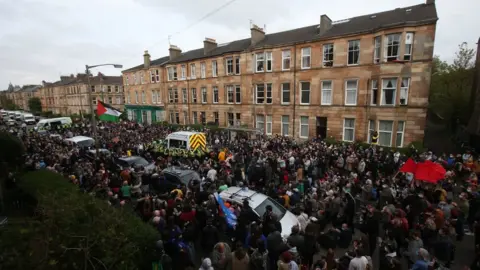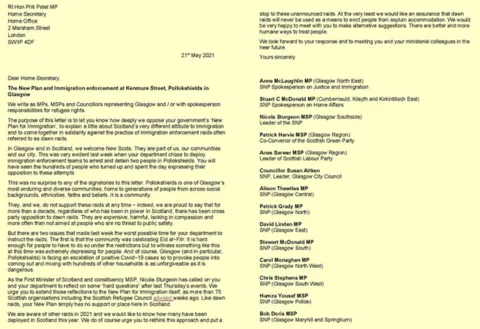Glasgow politicians write to Home Office over immigration policy
 PA Media
PA MediaA cross-party group of politicians from Glasgow have written to the Home Office to outline their opposition to the UK's immigration policy.
The letter's signatories, which include Nicola Sturgeon, specifically says they oppose unannounced raids.
It comes after hundreds of people gathered in the city earlier this month to prevent the removal of two men by immigration enforcement officials.
The Home Office said it would continue to tackle illegal migration.
The letter's 27 signatories range from party leaders, including the SNP leader and first minister Nicola Sturgeon, Scottish Labour's Anas Sarwar, and the Greens' Patrick Harvie, to Susan Aitken, the SNP leader of Glasgow City Council, and a range of other SNP, Labour and Green MSPs, MPs and councillors who represent the city.
It is addressed to Home Secretary Priti Patel, and states that they "deeply oppose" the UK government's immigration policies.
Its New Plan for Immigration includes a pledge to speed up deportations for those who have entered the country by what the UK government calls illegal means.

The letter continues that it wants to "explain a little about Scotland's very different attitude to immigration and come together... against the practice of immigration enforcement raids".
It says that "New Scots" are welcome in Glasgow and Scotland, and that this "was very evident last week" when protesters prevented the removal of two men by immigration officials.
The Home Office said at the time that two Indian nationals had been detained and later released on bail over "suspected immigration offences", adding that appropriate legal protocol was followed.
'Worst possible timing'
The letter continues: "We do not support these raids at any time... They are expensive, harmful, lacking in compassion, and more often than not aimed at people who are no threat to public safety."
It also notes that the raid was carried out at the "worst possible time", pointing out that Pollokshields is currently a Covid hotspot.
"To provoke people into coming out and mixing with hundreds of other households is as unforgiveable as it is dangerous," it says.
It adds that it was also "extremely distressing" for the diverse community to witness the scene on Eid.
"Like dawn raids, your new plan [for immigration] simply has no support or place here in Scotland," the letter says.
In response to the situation in Glasgow earlier this month, the Home Office issued a statement which said: "The UK government is tackling illegal immigration and the harm it causes, often to the most vulnerable people by removing those with no right to be in the UK.
"The operation in Glasgow was conducted in relation to suspected immigration offences and the two Indian nationals complied with officers at all times.
"The UK government continues to tackle illegal migration in all its forms and our New Plan for Immigration will speed up the removal of those who have entered the UK illegally."
Speaking on the Andrew Marr Show on Sunday, Home Secretary Priti Patel said: "The government has a responsibility to remove people from the United Kingdom with no legal status to be here. And that includes some of the individuals, foreign national offenders, and people that have brought great harm to our country.
"So we will continue to enforce our laws and legislation to remove those with no legal basis to be in the UK."

What do the new proposals promise?
 PA Media
PA MediaPowers over immigration are reserved to Westminster, and the UK government recently unveiled new policies for migration.
The Home Office said that "for the first time" the question of whether asylum seekers enter the UK via another "safe" country, such as France would "have an impact" on how it dealt with claims.
The government would seek the "rapid removal from the UK" of rejected applicants, with appeals "reformed to speed up" the process, it added.
But asylum seekers fleeing persecution or violence and coming to the UK via the "legal resettlement" route from countries such as Syria and Iran would straight away get permission to remain in the UK indefinitely, the Home Office said.
Under the new plans, anyone who pays criminal gangs to bring them to the UK would only ever receive temporary permission to remain and would be regularly assessed for removal from the UK.
Other proposals include bringing in "rigorous" age checks to stop adults entering the country by pretending to be children.
The use of hotels to accommodate arrivals will end and the government will bring forward plans to expand the "asylum estate".
Ms Patel said asylum applicants with criminal records who returned to the UK after being deported would receive a jail sentence of up to five years. The current maximum is six months.
And people-smugglers - responsible for shipping many of the 8,500 people who crossed the English Channel in small boats last year - could get life sentences.
